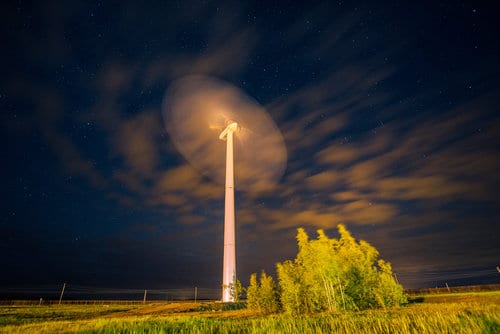
It has been a week for thinking big. Wind developers in the US were told they must do so by Dong Energy. The UK government did so in its own way, saying it is preparing to auction the Green Investment Bank, the world’s first privatisation of a specialist development bank. In Canada, Prime Minister Justin Trudeau said the federal government and the provinces had agreed to put a price on carbon emissions, while in India the government decided to double the tax on coal.
In the US, offshore wind developers need to install 500MW annually for the next 15 years for the technology to make economic sense, according to Dong Energy, the world’s biggest developer of sea-based turbines. Large-scale projects will be the key to reducing installation costs and making electricity from offshore wind farms affordable, said Thomas Brostrom, the Fredericia, Denmark-based company’s general manager for North America.
Offshore wind has thrived for more than a decade in Europe, helped by subsidies in the UK, Germany and elsewhere. The expense of building massive turbines at sea has prevented the industry from taking hold in the US. Dong is seeking to change that, and sent Brostrom to run its first US office in July.
Dong has acquired leases for two US sites, in the waters of New Jersey and Massachusetts, and is scouting the East Coast for other locations, Brostrom said. The company pioneered the world’s first offshore wind farm in 1991, and has projects with more than 2,000MW of capacity in operation and another 1,000MW under construction. On the subject of big thinking in the wind sector, BNEF ranks the world’s top turbine manufacturers in this Insight Note.
Back in Europe, UK business secretary Sajid Javid said the government is starting an auction to sell the Green Investment Bank in a deal that may value the institution at as much as GBP 4.2bn ($5.9bn). The government would start a bidding process to sell 75% to 100% of the institution, Shaun Kingsbury, chief executive officer of the Green Investment Bank, said in an interview. The deal is due to be complete by the end of the year.
“The Green Investment Bank is a world first, and it is a sign of its success that the idea is being copied globally,” Javid said on 2 March. “Having proven the business model works, we now want it to make an even greater impact.”
Privatisation would let the bank, which has channeled money into clean energy projects, invest more overseas and in technologies currently restricted by European Union state aid rules. Potential new projects include electric vehicles and power-grid upgrades, Kingsbury said.
Kingsbury said he’s seeking new owners to invest as much as GBP 800m a year for the next three years, and that the bank currently manages assets valued at about GBP 1.8bn. This would take the value of investment required in the bank to about GBP 4.2bn.
Meanwhile, India doubled the clean-energy tax on coal to fight environmental pollution, risking higher electricity-generation costs at a time when it is also seeking to revive ailing power distributors.
The tax on the fuel, which fires more than 60% of the nation’s generation capacity, will be raised to INR 400 a tonne from INR 200, finance minister Arun Jaitley said in his budget speech for the year beginning 1 April. The government plans to allocate INR 30bn ($438m) annually to come up with a comprehensive plan, spanning 15-20 years, to augment nuclear power generation.
Taxing coal and promoting nuclear energy shows the government’s commitment to the environment, said Debasish Mishra, a partner with Deloitte Touche Tohmatsu India in Mumbai. Still, the tax increase could have waited, especially since the government is working with the states to reduce the debt burden on state-owned power distributors.
In another approach to carbon, Canada is following the example of some provinces in pricing carbon emissions. The federal government and its provinces have agreed in principle to put a price on carbon emissions, Trudeau announced on 3 March.
In announcing the Vancouver Declaration on clean growth and climate change with provincial and territorial leaders, the Prime Minister gave no details on how and when a carbon price—or regional carbon prices—would be determined. But he said the federal government and the leaders of 10 provinces and three territories meeting to discuss climate changed reached agreement on “a suite of issues that will include carbon pricing.”
The plan builds on experiences such as those in Quebec and California, the progress of which is tracked by BNEF in this Insight Dataset.
Separately, Ontario unveiled details of its cap-and-trade system, which starts next year. Companies with more than 25,000 tonnes of greenhouse gas emissions annually will be required to take part in the program, the government announced. It also said it plans to set the initial carbon price at about CAD 18 ($13) per metric ton of carbon emissions.
In the UK, the case for energy storage made news again this week, when a report funded by three utilities said storage technologies may save the country’s consumers as much as GBP 2.4bn ($3.35bn) a year by 2030.
By curbing the need for grid upgrades and boosting use of wind turbine and solar panels, energy storage could deliver savings equal to about GBP 50 pounds a year for households, EON, SSE and Scottish Power said in a report on 2 March. The paper was written by the Carbon Trust, an organisation that helps companies reduce their greenhouse gas emissions.
The Department of Energy and Climate Change will call for evidence in the first half of this year about how to reduce regulatory barriers, according to an e-mailed statement from the department.
BNEF analyses the drivers of residential storage technology and cost reduction in this Insight Note.










